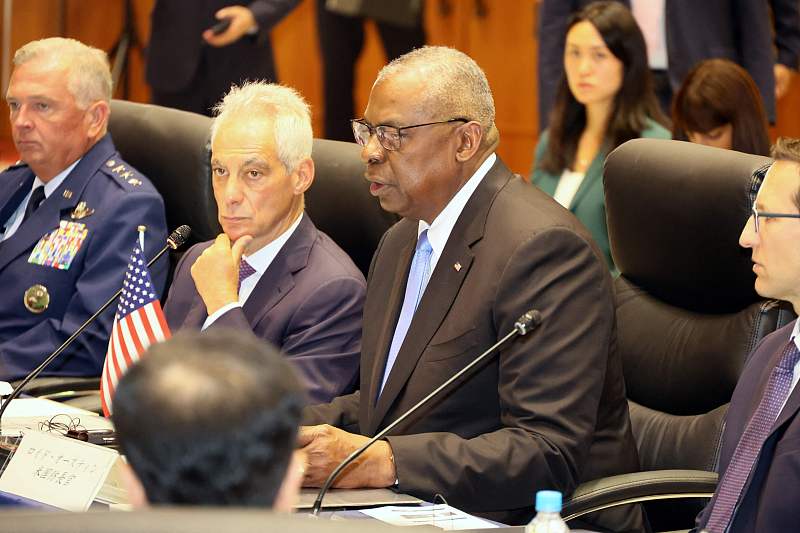
US, Japan and ROK hold trilateral defense ministers' meeting in Tokyo on July 28, 2024, local time. (Photo/VCG)
By Chen Yang
A series of bilateral and multilateral meetings were held in Tokyo from July 28 to 29 including the US-Japan "2+2" foreign and defense ministerial meeting, US-Japan-ROK defense ministers' meeting, and US-Japan-India-Australia quadrilateral meeting (QUAD). These meetings, either dominated or joined by the US, were all pointing fingers at China's internal affairs and aiming to gang up with regional allies and partners to contain China's development, despite their different priorities. The US should abandon the Cold War mentality and the obsession with containing and suppressing China, and stop trying to introduce bloc confrontation, conflict and war to the Asia Pacific.
The closer military ties with the US will only make Japan lose more of its security independence. In the US-Japan "2+2" joint statement released on July 28, the US confirmed the reconstitution of US Forces Japan (USFJ) to a Joint Force Headquarters, which will complement Japan's establishment of the JSDF Joint Operations Command (JJOC), a standing organization with centralized command over Japan's ground, maritime and air self-defense forces, early next year. The two sides also planned to broaden the types and increase the capacity of their joint manufacturing of military equipment. These changes indicate the accelerated military integration between the two countries.
However, the closer military ties will only further peg Japan in a security dilemma. Japan's Mainichi Shimbun reported worriedly that with the accelerated military integration with the US, Japan will be forced to follow America's military actions and the JSDF will have to follow US command. Japan's Asahi Shimbun reckoned that as the two countries announced their decision to intensify the joint manufacturing of military equipment, Japan would have become America's contractor when the latter was in need of weapons.
By forming a number of cliques, the US is sacrificing other countries' strategic security to cement its own hegemony. In recent years, the US has forged a string of exclusive cliques with the US-Japan alliance in the center, such as the US-Japan-ROK, US-Japan-Philippines, and US-Japan-India-Australia circles, to contain China's development and interfere more heavily in regional affairs.
At the US-Japan-India-Australia foreign ministers' meeting on July 29, Washington emphasized the importance of promoting the "Indo-Pacific strategy", obviously taking the small circles as the stepping stone for its own hegemony in total disregard of the common interests and long-term benefits of countries in the region. What the US is doing will sabotage the mutual trust and cooperation among regional countries and intensify their confrontation and division.
America's ganging-up activities go counter to the regional countries' wish for enduring peace and prosperity. In recent years, the US has been strongly pushing its "Indo-Pacific strategy" and engaging in the so-called major-country competition with a view to forging a system of allies and partners in the Asia Pacific to contain China's development. On the South China Sea issue, for instance, the US has been instigating some countries to engage in confrontation with China, which has damaged the political mutual trust and stability in the region. Such political manipulations have broken the long-standing fine tradition in the region of settling disputes through dialogue and consultation, adding more complexities and tension to the regional political landscape.
The Asian Pacific region, despite its shortcomings in security mechanisms, has benefited from the enduring peace it has managed to maintain after the end of the Cold War. Now the precious peace is put at high stake by the US. That is obviously against the regional countries' universal pursuit of peace and stability. The peace, cooperation, stability and prosperity that Asia Pacific enjoys today are credited to the concerted efforts of all countries in the region, where the last thing we need is a military bloc, much less the major-country confrontation and the "cliques" advocating a new Cold War.
Editor's note: Originally published on haiwainet.cn, this article is translated from Chinese into English and edited by the China Military Online. The information and opinions in this article do not necessarily reflect the views of eng.chinamil.com.cn.













